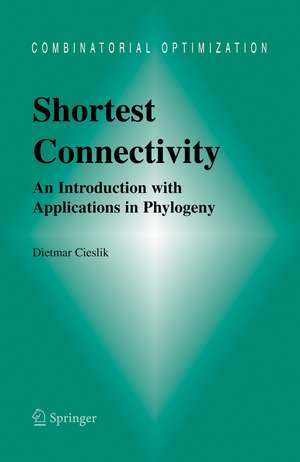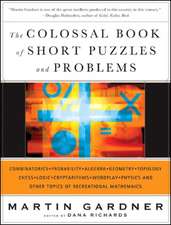Shortest Connectivity: An Introduction with Applications in Phylogeny: Combinatorial Optimization, cartea 17
Autor Dietmar Ciesliken Limba Engleză Hardback – 19 noi 2004
| Toate formatele și edițiile | Preț | Express |
|---|---|---|
| Paperback (1) | 624.46 lei 38-44 zile | |
| Springer Us – 21 noi 2014 | 624.46 lei 38-44 zile | |
| Hardback (1) | 645.79 lei 6-8 săpt. | |
| Springer Us – 19 noi 2004 | 645.79 lei 6-8 săpt. |
Din seria Combinatorial Optimization
- 18%
 Preț: 951.14 lei
Preț: 951.14 lei - 20%
 Preț: 649.93 lei
Preț: 649.93 lei - 20%
 Preț: 1290.40 lei
Preț: 1290.40 lei - 20%
 Preț: 1925.46 lei
Preț: 1925.46 lei - 15%
 Preț: 678.04 lei
Preț: 678.04 lei - 18%
 Preț: 954.14 lei
Preț: 954.14 lei -
 Preț: 393.13 lei
Preț: 393.13 lei - 15%
 Preț: 645.79 lei
Preț: 645.79 lei - 20%
 Preț: 1012.22 lei
Preț: 1012.22 lei - 18%
 Preț: 955.40 lei
Preț: 955.40 lei - 15%
 Preț: 698.30 lei
Preț: 698.30 lei - 18%
 Preț: 1665.54 lei
Preț: 1665.54 lei - 20%
 Preț: 988.00 lei
Preț: 988.00 lei - 15%
 Preț: 642.36 lei
Preț: 642.36 lei - 20%
 Preț: 988.48 lei
Preț: 988.48 lei - 15%
 Preț: 637.13 lei
Preț: 637.13 lei -
 Preț: 408.16 lei
Preț: 408.16 lei
Preț: 645.79 lei
Preț vechi: 759.76 lei
-15% Nou
Puncte Express: 969
Preț estimativ în valută:
123.59€ • 128.55$ • 102.03£
123.59€ • 128.55$ • 102.03£
Carte tipărită la comandă
Livrare economică 14-28 aprilie
Preluare comenzi: 021 569.72.76
Specificații
ISBN-13: 9780387235387
ISBN-10: 0387235388
Pagini: 268
Ilustrații: IX, 268 p.
Dimensiuni: 155 x 235 x 18 mm
Greutate: 0.57 kg
Ediția:2005
Editura: Springer Us
Colecția Springer
Seria Combinatorial Optimization
Locul publicării:New York, NY, United States
ISBN-10: 0387235388
Pagini: 268
Ilustrații: IX, 268 p.
Dimensiuni: 155 x 235 x 18 mm
Greutate: 0.57 kg
Ediția:2005
Editura: Springer Us
Colecția Springer
Seria Combinatorial Optimization
Locul publicării:New York, NY, United States
Public țintă
ResearchCuprins
Two Classical Optimization Problems.- Gauss’ Question.- What Does Solution Mean?.- Network Design Problems.- A New Challenge: The Phylogeny.- An Analysis of Steiner’s Problem in Phylogenetic Spaces.- Tree Building Algorithms.
Recenzii
From the reviews of the first edition:
"The aim of this graduate-level text is to summarize mathematical concepts concerned with problems of shortest connectivity, and to demonstrate important applications of the theory, in particular in biology. … The book contains extensive references and gives rise to many problems for further research. … Examples are discussed in the history of evolution, taxonomy, historical linguistics and others." (Günther Karigl, Zentralblatt MATH, Vol. 1086, 2006)
"The aim of this graduate-level text is to summarize mathematical concepts concerned with problems of shortest connectivity, and to demonstrate important applications of the theory, in particular in biology. … The book contains extensive references and gives rise to many problems for further research. … Examples are discussed in the history of evolution, taxonomy, historical linguistics and others." (Günther Karigl, Zentralblatt MATH, Vol. 1086, 2006)
Textul de pe ultima copertă
The problem of "Shortest Connectivity" has a long and convoluted history: given a finite set of points in a metric space, search for a network that connects these points with the shortest possible length. This shortest network must be a tree and may contain vertices different from the points which are to be connected. Over the years more and more real-life problems are given, which use this problem or one of its relatives as an application, as a subproblem or a model.
This volume is an introduction to the theory of "Shortest Connectivity", as the core of the so-called "Geometric Network Design Problems", where the general problem can be stated as follows: given a configuration of vertices and/or edges, find a network which contains these objects, satisfies some predetermined requirements, and which minimizes a given objective function that depends on several distance measures. A new application of shortest connectivity is also discussed, namely to create trees which reflect the evolutionary history of "living entities".
The aim in this graduate level text is to outline the key mathematical concepts that underpin these important questions in applied mathematics. These concepts involve discrete mathematics (particularly graph theory), optimization, computer science, and several ideas in biology.
This volume is an introduction to the theory of "Shortest Connectivity", as the core of the so-called "Geometric Network Design Problems", where the general problem can be stated as follows: given a configuration of vertices and/or edges, find a network which contains these objects, satisfies some predetermined requirements, and which minimizes a given objective function that depends on several distance measures. A new application of shortest connectivity is also discussed, namely to create trees which reflect the evolutionary history of "living entities".
The aim in this graduate level text is to outline the key mathematical concepts that underpin these important questions in applied mathematics. These concepts involve discrete mathematics (particularly graph theory), optimization, computer science, and several ideas in biology.
Caracteristici
No other graduate level textbooks for network design and phylogenetic reconstructing Includes supplementary material: sn.pub/extras

















